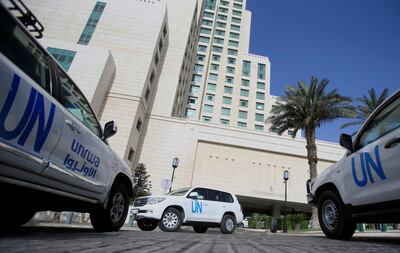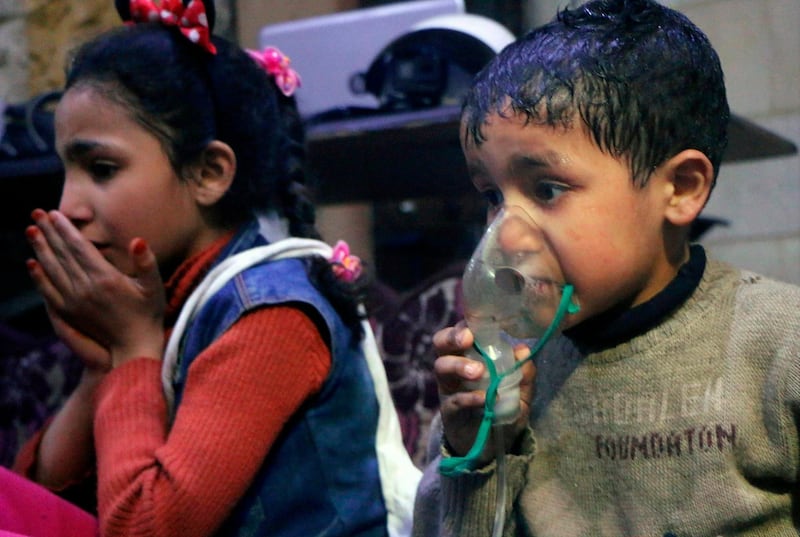Three Belgian companies are set to be prosecuted for exporting chemicals to Syria, including a common substance that can also be used in the production of sarin nerve gas.
The case is scheduled to commence on May 15 and will focus on the export of a number of chemical substances between 2014 and 2016 to Lebanon and Syria.
"The companies had no export licence for these products," a spokesman for the court said in reference to chemical group AAE Chemie and two handling agents, Danmar Logistics and Anex Customs.
The firms says they were unaware of the licence requirements they allegedly lacked.
"Both my companies and AAE Chemie have always acted in good faith. We have always fully complied with the checks of customs officers at the port of Antwerp," a spokesman for Danmar Logistics said.
Under Belgian law a defendant is not required to enter a plea.
Widely used as an industrial solvent and also in some medical products, isopropanol, or rubbing alcohol, is one of two key ingredients for sarin. Since 2013 companies need a licence to export chemicals to Syria.
Syrian President Bashar Al Assad has been accused of using chemical weapons, including sarin, against its own population. The most recent example took place in Douma on 7 April and resulted in the death of over 40 people and the injury of hundreds. The Syrian government and its Russian ally deny this.
In response to the chemical attack, on 14 April the US, UK and France launched a co-ordinated air campaign. The strikes targeted a research centre, two chemical weapons facilities and a regime command centre.
President Donald Trump declared the strikes a success. "A perfectly executed strike last night," he tweeted. "Could not have had a better result. Mission Accomplished!"

However US assessments of the strikes show they had only a limited impact on Mr Al Assad's ability to carry out chemical weapons attacks, four US officials said.
The conclusion contrasts with the Trump administration's assertion that the strikes on Saturday hit at the heart of Mr Al Assad's chemical weapons programme.
The US officials, who spoke to Reuters on condition of anonymity, said the available intelligence indicated that Mr Al Assad's stock of chemicals and precursors was believed to be scattered far beyond the three targets.
Some of it, US and allied intelligence suggests, is stored in schools and civilian apartment buildings, which one of the officials referred to as "human shields."
US Defense Secretary Jim Mattis, in remarks to Congress a day before the strikes, acknowledged that one of his top priorities in crafting the operation would be to minimize the loss of civilian lives.
Asked about the assertion that the strikes had only a limited impact, a White House National Security Council spokesman said the purpose of the military operation was to hold Syria's government accountable, degrade its capability and deter it from chemical attacks in the future - "all while minimizing civilian casualties."
_______________
Read More:
Chemical weapons inspectors to start work as rebels leave Douma
Syria’s chemical attacks: A timeline of the war's confirmed cases
Chemical weapons use 'normalised' by Syria, says UK's Theresa May
_______________
The assessment indicated that although the strikes did degrade Syria's chemical weapons capability, a large quantity of the chemical weapons was stored elsewhere and that Syria's chemical weapons programme, while crude, "is about as good as it needs to be for Assad's purposes," an official said.
A team from the Organisation for the Prohibition of Chemical Weapons arrived in Syria just hours after unprecedented US-led strikes on regime targets Saturday, launched in response to the alleged gas attack.
But the watchdog on Wednesday said safety fears had hampered plans for the experts to travel to Douma, a town that was controlled by rebels until Russian-backed regime forces fully retook it last week
According to the UN report, a security team travelled to two sites on Tuesday escorted by Russian military police.
At the second location, "there was an explosion followed by small-arms fire directed at (the) UNDSS team and the Russian military police," said the report, adding that the team had returned safely to Damascus.
OPCW chief Ahmet Uzumcu said the incident highlighted "the highly volatile environment" in which the fact-finding team had to work.
He added he would only consider deploying the team to Douma with UNDSS approval and if the inspectors had "unhindered access to the sites".
Syria's UN ambassador Bashar Jaafari told the Security Council on Tuesday that the OPCW experts would begin their investigation once they received the all-clear from the UN team.





